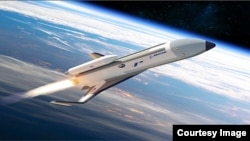The next generation hypersonic space plane just took a big step toward reality as the Defense Advanced Research Projects Agency (DARPA) announced Boeing will “complete advanced design work” for the Experimental Spaceplane, XS-1.
The goal of the project is to offer quicker access to low Earth orbit, decreasing the preparation time to launch from months to days. For example, in the case of the loss of a military or commercial satellite, the unmanned, reusable XS-1 could quickly be used to launch a replacement.
“The XS-1 would be neither a traditional airplane nor a conventional launch vehicle, but rather a combination of the two, with the goal of lowering launch costs by a factor of 10 and replacing today’s frustratingly long wait time with launch on demand,” said Jess Sponable, DARPA program manager.
According to DARPA, the XS-1 will be about the size of a business jet and take off vertically, propelled not by external boosters but by “self contained cryogenic propellants.” After reaching a suborbital altitude, the plane would launch an expendable upper stage that would be able to push a satellite into orbit. The plane would then return to Earth, landing like a plane.
DARPA said the plane could then be reused “potentially within hours.”
The XS-1 could fly as fast as Mach 10, DARPA said.
The XS-1 is still years away from reality, with DARPA saying testing the plane’s engines on the ground slated for 2019.





